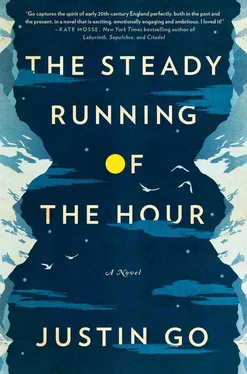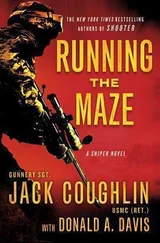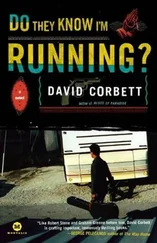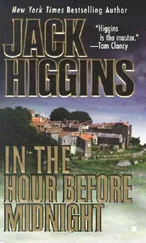Imogen
It is all he will hear from her. It is still a lie, but less of a lie than anything else she can say. Imogen shudders to think of this, but she reminds herself that the letter is not the cruelty, its consequences are. Once she had accepted those consequences, it had not been fair to hide them from Ashley, for he had asked for an honest reply and this is the best she can give.
Still it hurt so much to think of Ashley reading the letter. It hurt enough that she had not written it for six days, even when the words were clear in her head, even when she knew she could not go back to him. The lie about the child is worst of all, but what is cruel to Ashley is the only decent thing for Eleanor and Charles, who could hardly be expected to raise a child whose parentage might one day be questioned. And perhaps they needed an ending to this, all of them, even Ashley, even Imogen herself. If they are to move forward, they must know they cannot go back.
But what will come of all this? After the child is born the sisters will return to England. Eleanor will take the child and raise it as her own; Imogen will slip into the fog and shadow of London, the vivid chapter of her life already behind her. And Ashley — could he possibly survive the war? Might she have been wrong to think he had no chance, that only she could save him? Perhaps that had only been arrogance, the conceit that she could see things that he could not. Perhaps in leaving him she had only condemned herself to scanning the casualty lists in the newspaper every morning, never knowing if he lived or died until she saw him by chance across the room at a Mayfair party, or crossing Russell Square with another woman. No, Imogen cannot have that. Better to begin anew, to live among strange faces that would neither know nor judge her.
Imogen drags her finger in the snow and makes a few tentative shapes. A circle. Half the curve of a heart. She finds her hand dragged by a light but inexorable gravity, perhaps her own, and it draws across the crystals to mark her own initials, then the tall letter A . Imogen stops here, embarrassed by this childish gesture, even among the solitude of trees and snow. As a girl she had often drawn shapes in the sand of Sussex beaches, and now she considers how that sand felt similar and yet was different, resting for years upon the same shore rather than disappearing with the first thaw of spring. But surely ice melted into streams and waterfalls will return again as snow, the very same droplets? She hardly knows. It frustrates her, for Imogen had expected that by this age she would understand so much more than she does.
She glances back toward the house, but she has come far enough that the forest obscures all. It is very cold here. Could it be so cold in France? It is not so far north as here, Imogen considers, but it must feel so much colder, shivering in clammy garments at dawn stand-to, sleeping rough each night upon the frozen ground. How little she understands of all this. She is weeping now and perhaps a little feverish.
— I shan’t ever change, she whispers, reveling in the completeness of this lie.
Imogen draws her boot across the snow, smoothing away all her marks. I shan’t grow older or love you any less , she thinks. I shan’t love another or ever disappoint you, and we shall never be parted, not for one moment, from this world to the next.
A figure is coming through the trees. Eleanor in a long cloak, bearing a mug of something steaming. She draws beside Imogen and hands her the tea.
— You’ve had your walk, Eleanor says. Now for God’s sake darling, come inside before you freeze.
Exploration is the physical expression of the Intellectual Passion. And I tell you, if you have the desire for knowledge and the power to give it physical expression, go out and explore. If you are a brave man you will do nothing: if you are fearful you may do much, for none but cowards have need to prove their bravery.
— Apsley Cherry-Garrard, The Worst Journey in the World

22 February 1924
Russell Square
Bloomsbury, Central London
Ashley comes out of the Underground station and buys the evening newspaper from a hawker, folding it under his arm and continuing eastward. It is six o’clock and all the city is traveling homeward, hordes in dark suits swarming the pavement and tube entrances. Ashley rounds the corner onto Lamb’s Conduit Street. He arrives at the public house half an hour early.
It is a charming pub. There are large frosted windows facing the street, and beneath these a wall of green porcelain tile. Ashley enters the saloon bar and orders a pint of bitter, watching the barman’s hands pump the ebony lever in three smooth strokes, the swoosh of foaming ale into the tulip glass. The barman’s face is hidden behind a screen of paneled glass hung at eye level above the whole length of the saloon bar, blocking the view of the poorer classes in the public bar opposite. All the panels in the screen are shut.
Ashley brings his glass to a small round table. He takes a sip of beer, his first taste of English ale in five years. He imagined that it would make him remember something, but it does not. The flavor is at once familiar and unremarkable. At the first drink, it is as if he had never been away.

It is over now. Ashley had trained hard and whether the training was sufficient or not, it is over. The expedition leaves on Friday. Ashley will face the Himalaya as he is, stronger certainly than he has ever been, though whether he is equal to the mountain he cannot say. There had been no rubric to judge this, so he had simply trained as much as he could bear.
It had begun in the summer, before he had even known for certain that he would be accepted on the expedition. He had heard conflicting rumors from the start, but it was fine enough to be back in the Alps again, away from the aimless asceticism of his Arabian wanderings, returned to solid granite where he thought only of the rockface before him. And Ashley was good at it and he liked it. It had not been like the wretched coffee plantation in Kenya, which he had been good at and hated, or like Arabia, which he had liked at times but had never been good at. At twenty-nine Ashley had been climbing for thirteen years and was probably at the peak of his powers. This last season in the Alps had proven it. It had been grueling but also dazzling, and it had ended in August with the news of his place on the expedition: a telegram waiting for him on the front desk of the Hotel du Mont-Collon, Ashley tearing open the envelope, his face coloring as he laughed and passed the message to the desk clerk, fumbling in giddy French to translate its significance.
— Je vais monter , Ashley had explained, le plus haut montagne du monde.
And when at last the clerk was made to understand, all he could say, all anyone could say were the same two words. — Bon courage .
That telegram, twelve words taped onto a slip of paper, had changed everything. At first Ashley intended to winter in the Alps, training on snow until the expedition sailed in February. He stayed at an auberge outside Les Haudères and began to condition himself in earnest, climbing the mountain paths at daybreak, hewing and hauling timber for a fortnight until his hands blistered over and the innkeeper said there was no room left to store the logs. But with the first snow of autumn, Ashley found himself longing for the one place he had thought was behind him — England.
Читать дальше













